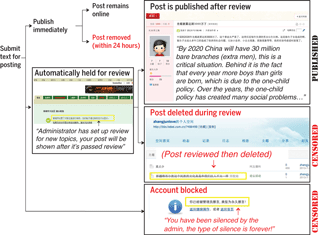August 22, 2014 report
Researchers reverse-engineering China's online censorship methods reveal government's deepest concerns

A trio of researchers, two from Harvard University and one from the University of California has used two broad techniques to better understand how online censorship works in China. In their paper published in the journal Science, the team describes how they set up their own Chinese web site in one part of their study and engaged in massive posting in the other, and what they learned as a result. Mara Hvistendahl offers an in depth perspective piece on the work by the trio in the same journal issue.
In the first part of the study, the researchers set up a social media web site that allowed visitors to post comments about a wide range of topics. The site was created using Chinese addressing, hosting services, software, etc., making it a truly Chinese site. The team even ordered the same software that other site owners use to censor posts, which allowed for study of criteria used for automatic blocking of posts.
In the second part of the study, the researchers, with the assistance of volunteers, created accounts on hundreds of Chinese social media sites and then began posting messages to see which types get blocked, which get removed and which are allowed to stay.
In analyzing what they learned from both parts of the their study, the researchers came to see that the people in charge of censoring their own social media web sites, are far more concerned about messages calling for mass action, than they are about comments that are more general, including those that might be critical of government officials. The software used to help censor comments tended to reject those that had phrases such as "go on the streets" or words such as "demonstration" while comments created by the team that criticized local government officials by name tended to not only get posted, but were left as written.
The team suggests that their research shows that that main reason for online censorship in China is to prevent the kind of dissent that can lead to people banding together to object to things they don't like. Criticism of local policies or officials on the other hand seems to help those higher up the chain determine who is doing a good job of suppressing dissent at the local level and who is not—which makes it easy to see who to keep and who to replace.
More information: Reverse-engineering censorship in China: Randomized experimentation and participant observation, Science 22 August 2014: Vol. 345 no. 6199. DOI: 10.1126/science.1251722
© 2014 Phys.org



















